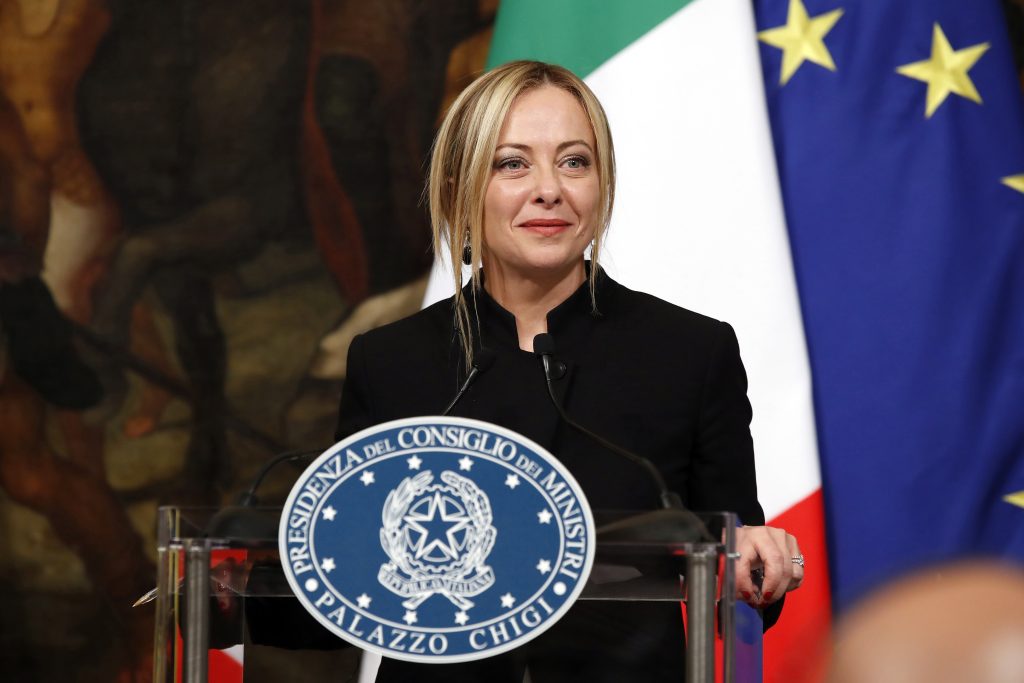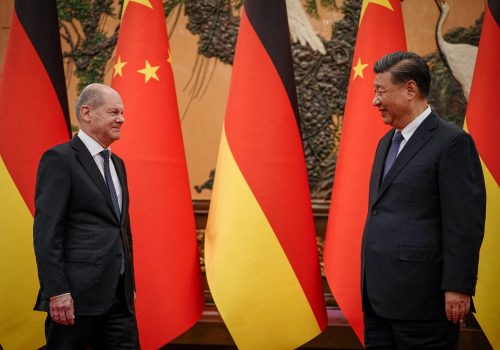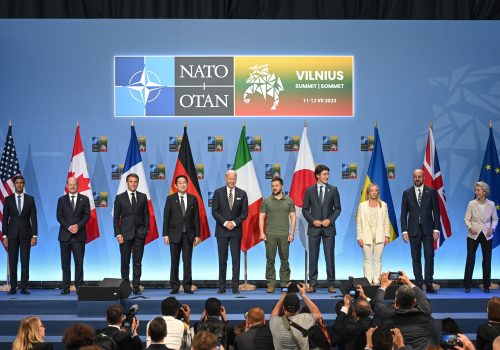Giorgia Meloni’s rise to Italian prime minister was an important break with her country’s recent past. She is the first woman to serve in her role and, as was widely reported when she took office in October, the first far-right leader since the end of World War II. Indeed, her party’s politics initially caused a great deal of uncertainty and even some concern about how her government would approach transatlantic cooperation. Other far-right parties in Europe, after all, hold starkly antagonistic views toward NATO and the European Union (EU).
But when it comes to assessing Meloni, the transatlantic community would be well advised to do its homework and embrace her leadership. Her actions have clearly demonstrated a pragmatic and unambiguous values-based commitment to the transatlantic relationship. It is what she does that matters, not what others say about her.
On July 27, Meloni will travel to the White House to meet with US President Joe Biden. Her visit comes as Italy prepares to take up the presidency of the Group of Seven (G7) next year, a critically important role given today’s geopolitical events. So what can Biden expect from the Italian leader on the important issues of the day?
Italy backs Ukraine’s fight for freedom and democracy
Meloni has kept Italy clearly committed to the pillars of the EU and the transatlantic community. She has been unambiguous in her stance against autocracies. Even more notable, she has been vocally supportive of Ukraine and clearly holds Russia accountable for its unprovoked aggression. The clarity of her position contrasts with the sometimes more ambiguous positions of other Italian coalition parties.
Under Meloni’s leadership, the Italian government has continued to back Ukraine against Russia with military aid. Indifferent to low public support for military aid for the effort—just 39 percent of the Italian public voices support for increased military aid for Ukraine—she has underscored the just cause. During a speech in the Italian Senate in March, she said, “The Ukrainian people are defending the values of freedom and democracy on which our civilization is based, and the very foundations of international law.” She added, “military aid was needed to help a nation under attack.” Meloni’s Fratelli d’Italia party, along with center-right coalition parties Lega and Forza Italia, have voted consistently in support for Ukraine, even when in opposition during the government of former Prime Minister Mario Draghi.
Will China’s Belt and Road continue to lead to Rome?
Another important area of Italy’s strategic dialogue with the United States will be the issue of transatlantic coordination on China. Italy became the first and only G7 member of the Belt and Road Initiative (BRI) in 2019, when it signed a Memorandum of Understanding with China. The populist coalition government promised new trade and investment, a well-received message at the time, but the economic benefits have not come to fruition.
Calling Italy’s membership in the BRI “a big mistake,” Meloni has indicated that she may not extend the agreement in 2024. With 51 percent of Italians holding a negative feeling about China, it may be easier for Meloni to join in a coordinated transatlantic decision on BRI.
The 2008 global financial crisis created massive opportunities for Chinese investors targeting stressed companies in search of technologies, innovation, and markets. In 2022, Italy was the second-largest import partner in Europe (behind Germany) for importing Chinese products, to the tune of more than fifty billion dollars. On the flip side, Italian exports to China make up less than 3 percent, or only eighteen billion dollars. Clearly, Italy’s optimistic vision for the BRI didn’t deliver.
Moreover, Meloni has been a strong voice in defending democratic values and criticizing China’s authoritarian crackdowns from Xinjiang to Hong Kong. She has criticized China’s mismanagement of the COVID-19 pandemic and dismissed the idea that China supported Italy during the depths of the crisis. Amid criticism of Chinese military exercises in the Taiwan Strait, she said last year that “the EU is an important market for China, that risks to be closed if Beijing decides to attack Taiwan.”
The importance of US-Italian economic relations
Beyond geopolitics, economic issues will also likely be on the agenda in the Biden-Meloni meeting. Here they have a strong base to build on. Trade between the United States and Italy has almost doubled from $52 billion to $100 billion in the last decade. Unlike with China, Italy’s trade balance with the United States has always been positive. Last year, for example, Italian exports to the United States reached $73 billion. The United States is the second-largest export market for Italy, making up 11 percent of all exports and more than 20 percent of non-EU exports. Similarly, Italy is the third-largest market in the EU and the eighth largest in the world by nominal gross domestic product; with a population of about sixty million it is the sixteenth largest export market for the United States, with significant trade and investment opportunities concentrated in high-value sectors.
Italian stock of investment in the United States has totaled more than $41 billion, supporting almost one hundred thousand American jobs. To put this it into perspective, Italian foreign direct investment in the United States is almost four times its investment in China. On the horizon, as part of the EU’s post-COVID recovery program, Italy will be the recipient of a more than $200 billion National Recovery and Resilience Plan focusing on three strategic axes: digitalization and innovation, ecological transition, and social resilience aimed at fixing structural economic challenges and inefficient infrastructure to invite serious investment from the United States. Italy ranked ninth among EU destinations for US foreign direct investment in 2022, with a stock of around $26 billion.
When Biden and Meloni meet at the White House, they will share a strong commitment to transatlantic cooperation on major geopolitical issues. The big areas of discussion will likely focus on cooperation to face global challenges, from economic growth to common security, where Italy has a very important role in North Africa and the Sahel that meets Biden’s strategy to create new diplomatic alliances in Africa and a Western alternative to China’s BRI. Strengthening economic cooperation should also be a priority, going beyond the traditional sectors in which US investments are mostly concentrated, such as manufacturing, electronics, telecommunications, and services. Washington and Rome should, for example, help facilitate new collaboration in industries working on artificial intelligence, the energy transition, and defense.
Meloni and Biden are more aligned than many observers may think. Biden should take this chance to build on her promising start.
Valbona Zeneli is a nonresident senior fellow at the Atlantic Council’s Europe Center and chair of strategic engagements at the George C. Marshall European Center for Security Studies.
Further reading
Fri, Jul 14, 2023
Is Germany shifting its approach on China?
New Atlanticist By
Germany released its first-ever China strategy. Experts weigh in on what this means for the future of relations between Berlin and Beijing.
Fri, Jun 30, 2023
The next European Union member is…
New Atlanticist By
Ten years after Croatia joined the bloc—the last country to do so—Atlantic Council experts look at eleven countries that might join next.
Tue, Jul 11, 2023
Experts react: What NATO’s Vilnius summit means for Ukraine and the Alliance’s future
New Atlanticist By
Atlantic Council experts decode the summit's implications for Ukraine's membership, NATO's approach to China, and more.
Image: Prime Minister Giorgia Meloni speaks during the meeting with the President of Ukraine Volodymyr Zelensky at Chigi Palace in Rome, Italy, on May 13, 2023.



